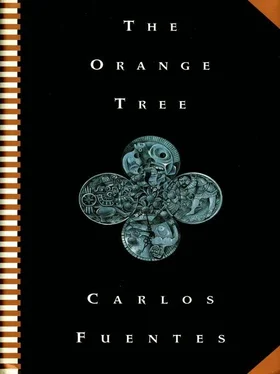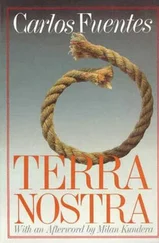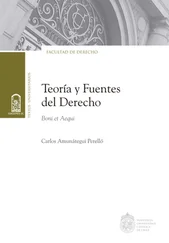Could the horse be the dream of a god who never communicated his secret nightmare to us?
An Indian could never overcome an armed Castilian on horseback, and this is the true secret of the conquest, not any dream or prophecy. Cortés exploited his meager cavalry to the limit, not only in attacks or fights in open country but in specially prepared seaside cavalcades where the chargers seemed to shake the waves — so much so that even we Spaniards imagined that if the horses were not there, these coasts would be as calm as a mirror of water.
We stared in astonishment at the unthought-of fraternity between the sea foam and the foam on their dewlaps.
And in Tabasco, when Captain Cortés wanted to astonish the envoys of the Great Moctezuma, he paired off a stallion with a mare in heat and hid them, instructing me to make them whinny at the right moment. The king’s envoys had never heard that sound and succumbed in shock to the powers of the Teúl, or Spanish God, as the Indians called Cortés from that moment on.
The truth is that neither I nor anyone else had ever before heard such a whinny come out of the silence, devoid of a body, and reveal animal desire, bestial lust, with such crude force. My captain’s theatrics far surpassed his intentions and even shocked us Spaniards. It made all of us feel a bit like beasts …
But the emissaries of the Great Moctezuma had also seen all the portents of that year prophesied by their magicians concerning the return of their blond and bearded god. Our marvels — the horses, the cannon — only confirmed what they already carried in their eyes: comets at midday, water in flames, fallen towers, nocturnal shrieking of wandering women, children carried away by the wind …
And lo and behold, Don Hernán Cortés arrives at that precise moment, as white as winters in the Gredos mountains, as hard as the earth in Medellín and Trujillo, and with a beard older than he was. So they wait for the return of the gods and instead get people like the hunchback Rodrigo Jara or Juan Pérez, who killed his wife, known as the Cowherd’s Daughter, or Pedro Perón de Toledo, of turbulent descendancy, or a certain Izquierdo from Castromocho. Some gods! Even in the grave I cackle to think of it.
One image cuts off my laughter. The horse.
Even Valladolid, “the Fat Man,” looked good on horseback; I mean he inspired respect and awe. The mortality of the man was saved by the immortality of the horse. Cortés was right when he told us from the first moment: “We shall bury the dead at night and in secret. That way our enemies will think us immortal.”
The rider fell; never the charger. Never; not Cortés’s bay, not Alonso Hernández’s silver-gray mare that ran so well, not Montejo’s sorrel, not even Morán’s splayfooted, spotted nag. So it wasn’t just men who entered the Great Tenochtitlán on November 3, 1520, but centaurs: mythological beings with two heads and six feet, armed with thunder and dressed in stone. And besides, thanks to the coincidences of the calendar, we’d been confused with the returning god, Quetzalcoatl.
Appropriately, Moctezuma received us on foot, halfway along the causeway that linked the valley to the city built on a lake, saying: “Welcome. You are home. Now rest.”
No one among us had ever seen a city more splendid than Moctezuma’s capital, neither in the Old World nor in the New: the canals, the canoes, the towers and wide plazas, the well-stocked markets and the novel things to be seen there, things never seen by us, things not mentioned in the Bible: tomatoes, turkeys, chili, chocolate, maize, potatoes, tobacco, agave beer, emeralds, jade, gold and silver in abundance, featherwork, and soft, mournful chanting …
Beautiful women, well-swept rooms, patios full of birds, and cages stuffed with tigers; gardens and albino dwarfs to serve us. Like Alexander in Capua, we were threatened by the delights of triumph. We were rewarded for our efforts. The horses were well taken care of.
Until one morning. Moctezuma, the great king who had received us with such hospitality in his city and in his palace, was in a royal chamber surrounded by all of us, when something happened that changed the course of our enterprise.
Cortés’s lieutenant, Pedro de Alvarado, bold and gallant, cruel and shameless, had red hair and a red beard, which made the Indians call him Tonantío, which means the Sun. Likable and brazen, Tonantío had been amusing King Moctezuma with a game of dice — another novelty for these Indians — and for the moment the monarch was distracted, incapable of guessing his fortune beyond the next toss of the dice, even when he was being cheated, as he was at that moment by the irrepressible Alvarado. The king looked irritated, because he usually changed clothes several times a day, and either his serving maids were late or his tunic smelled or itched, who knows what …
Just at that moment, four tamemes, or Indian bearers, walk into the chamber followed by the usual din of our guards, and with impassive expressions drop in front of Cortés and the emperor the severed head of a horse.
It was then that the conquistador’s second translator, an enslaved princess from Tabasco baptized Doña Marina but nicknamed La Malinche, quickly interpreted the messengers who’d come from the coast with news of an uprising of Mexicans in Veracruz against the garrison left there by Cortés. The Aztec troops had killed Juan de Escalante, head constable of the port, and six Spaniards.
Most important, they’d killed the horse. Here was the proof.
I noticed that Alvarado stood stock-still with his hand filled with dice in the air, staring at the hall-open, glassy eyes of the horse as if he’d seen himself in them and as if in the flint-cut neck, slashed as if in rage, the enraged and red-haired captain had seen his own end.
Moctezuma lost interest in the game, shrugging his shoulders a bit, and stared fixedly at the horse’s head. His eloquent eyes, however, silently told us Spaniards, “So you’re gods? Well then, behold the mortality of your powers.”
Cortés, on the other hand, stood staring at Moctezuma with such a face of betrayal that I could only read in it what our captain wanted to see in the king’s countenance.
I have never felt that so many things were said without a word being spoken. Moctezuma, approaching the horse’s head in a devout, almost humiliated fashion, said, without saying anything, that just as the horse died so could the Spaniards die if he decreed it. And he would decree it, if the foreigners did not withdraw in peace.
Without saying a word, Cortés warned the king that it would not be advisable for him to start a war that would ultimately destroy both him and his city.
Pedro de Alvarado, who knew nothing of subtle discourses, spoken or unspoken, violently threw the dice against the face of the horrifying divinity that presided over the chamber, the goddess named for her skirt of serpents. Before Moctezuma could say anything, Cortés stepped forward and ordered the king to abandon his palace and come to live in the one occupied by the Spaniards.
“If you sound an alarm or shout, you will be killed by my captains,” Cortés said in an even tone, impressing Moctezuma more by that than Alvarado had with his physical fury. Nevertheless, after his initial shock and dismay, the king responded by removing from his arm and wrist the seal of Huichilobos, the god of war, as if he were going to order our slaughter.
But all he did was excuse himself: “I never ordered the attack in Veracruz. I shall punish my captains for having done it.”
The handmaidens entered with the fresh clothes. They seemed flustered by the low tavern brawl they’d stumbled upon. Moctezuma recovered his dignity and said he would not leave his palace.
Читать дальше












